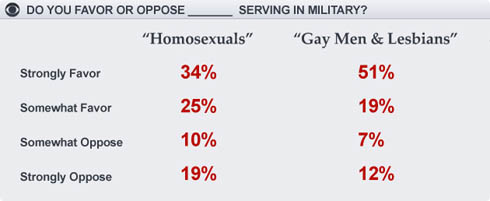Between “Don’t Ask, Don’t Tell” and Prop 8, there are lots of gay issues (and terms) in the news. These issues tend to be difficult for many media outlets to cover, as no one wants to offend anyone. Not the same-sex couple who traveled to Canada to get married. Not the fire-and-brimstone pastor who thinks all “homosexuals and sodomites are going to hell.” Not the average guy who might not “understand the lifestyle” but nevertheless says, “I love my dead gay son.”
In some cases, pastors and randoms are interviewed for stories in which they have no real stake. There could be a series of vignettes about same-sex couples who’ve been together 17 years and fought for benefits and survived illness after illness. And then, an awkward transition…. “While these couples want to get married, not everyone agrees. Just ask Joad Cressbeckler….” To be sure, not all of these are tacked on, but it makes me wonder: How did the media cover Loving vs. Virginia back in the 1960s? How cringe-worthy would that coverage appear if we looked at it now? How similar or different is it from how the media is covering these current civil rights issues concerning gays and lesbians?
Not only are the topics controversial, even the terms are hotly debated. A 2005 Gallup poll surveying moral attitudes placed onto the lives gay and lesbian Americans showed that “homosexual” has negative connotation to it compared to “gay”:
Proving the power of language in the debate, survey responses were nine to 10 percentage points higher when the term “gay and lesbian” was used instead of “homosexual.”
Earlier this year, a CBS News/ New York Times poll found that wording was key when asking whether Americans support allowing gays to serve in the military.
In its analysis of the 2005 poll, Daniel Gonzales Ex-Gay Watch pointed out the “right of any minority group to self-determine their own descriptive terminology.” It’s no longer acceptable for black people to be referred to as “negros,” Gonzales pointed out, so gays and lesbians should not be referred to as “homosexuals,” he argued.
For what it’s worth, here’s what’s in the GLAAD Media Reference Guide:
OFFENSIVE: “homosexual” (as a n. or adj.)
PREFERRED: “gay” (adj.); “gay man” or “lesbian” (n.)
Please use “lesbian” or “gay man” to describe people attracted to members of the same sex. Because of the clinical history of the word “homosexual,” it has been adopted by anti-gay extremists to suggest that lesbians and gay men are somehow diseased or psychologically/emotionally disordered – notions discredited by both the American Psychological Association and the American Psychiatric Association in the 1970s.
And from the National Lesbian & Gay Journalists Association stylebook:
homosexual: As a noun, a person who is attracted to members of the same sex. As an adjective, of or relating to sexual and affectional attraction to a member of the same sex. Use only if “heterosexual” would be used in parallel constructions, such as in medical contexts. For other usages, see gay and lesbian.

